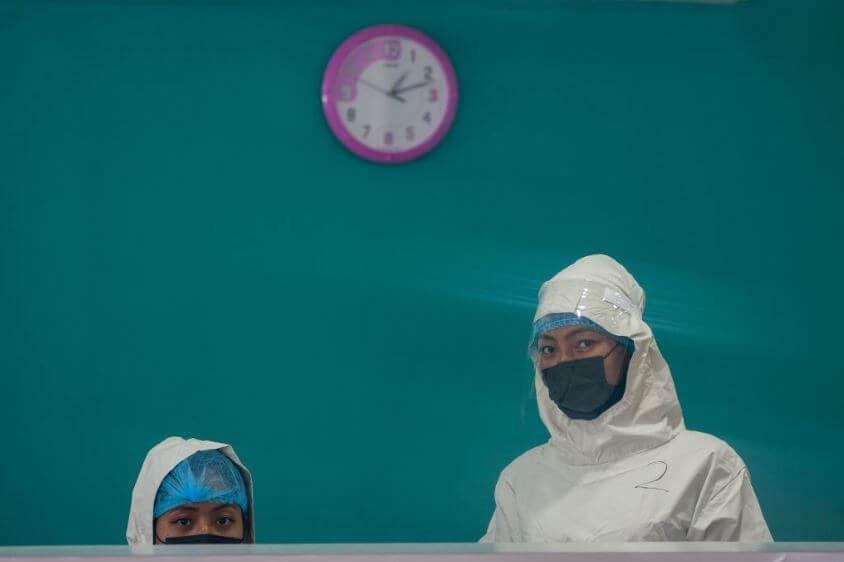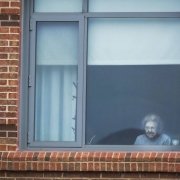I Love You, Please Don’t Touch Me
For health care workers, ‘the simple act of coming home from work is now a potential threat to our loved ones.’
I return home from the hospital and remove my clothing in the garage. I sprint to the shower in my underwear. I avoid touching anything in the house, including my wife and kids.
No welcome-home kisses. No hugs. Like the rest of the world, we are practicing social distancing. Except with an added gut-wrenching twist: My family must distance themselves from me.
Desperate for a moment of levity, I posted a question on Facebook: “Health care friends. Confession time. Who else disrobed in the garage then sprinted to a shower in your undies after work today?”
My friends’ responses made me laugh, smile, and cry. They describe various techniques of naked sprinting while avoiding the kids and getting clothes safely into the laundry. One employed a creative use of a garden hose, and another started the disrobing process in the hospital parking lot.
We try to find joy in the face of tragedy by tapping into camaraderie and unity. But it’s no fun to share in the harsh reality that the simple act of coming home from work is now a potential threat to our loved ones.
Like the rest of the world, we are practicing social distancing. Except with an added gut-wrenching twist: My family must distance themselves from me.
My colleagues are brave, professional, and committed. They are also fatigued, scared, and in pain. This is the new normal for health care workers as our families struggle with the challenges of social distancing.
The truth is that health care workers are potential vectors for transmission.
Covid-19 is spread through person-to-person contact. Respiratory particles get on our clothes and hands. We then pass the virus through handshakes, hugging, kissing, and other close human contact. The virus also survives on surfaces, making every item we touch a potential vector.
To protect ourselves and each other, we must limit close contact with others. At work, we wear masks and gloves to protect ourselves and our patients. And of course, many providers lack the supplies critical to preventing illness.
My heart breaks as I read stories of nurses wearing trash bags in a desperate attempt to find protection. My mother’s friends are knitting masks to send to workers in need. Bandanas are now suggested as a legitimate substitution. Physicians and nurses have formed Facebook groups to find solutions as we wait for help, guidance, and supplies from the government.
Bandanas, knitted face masks, and Facebook cannot be the way we manage a pandemic in the United States of America.
Families of health care workers are learning to adapt to this new reality. The CDC has not released specific guidelines for health care workers to follow in their homes, so we do our best. We want to protect our families, so we follow the same infection safety precautions at work and at home. Many of us limit contact with those we love the most. To protect them, we must stay away.
Out of school, sheltering in place, and 14 days into limited contact with me, my children are becoming conditioned. The social distancing way of life is sinking in. Last night, I approached my teenager for a hug, and he backed away. My daughter slid to the other side of the couch when I sat down. I compliment them on their diligence, but I feel the knife twisting inside all the same. It hurts.
To try and recreate normal life, my wife and I have recommitted to family dinners. We sit together and have a meal at the table. No TV. Electronics are banned. We play card games followed by family movie nights. Jumanji 2 was a hit. They loved Raiders of the Lost Ark. Wanting to educate about the pandemic, I quickly learned my choice of Contagion was too much too soon.
If your family is following social distancing guidelines and sheltering in place, then physical contact restrictions between family members are not needed. Continue diligent handwashing, but hug your children. Show them love and affection. Help comfort them through this scary time.
Oh, and hug your children for me — because I can’t hug mine.
…
The coronavirus outbreak is rapidly evolving. For updates, check the U.S. Centers for Disease Control and Prevention as well as your local health department. If you’re feeling emotionally overwhelmed, reach out to the Crisis Text Line.
Thank you to Elemental for publishing this article on Medium.
Blog Author: Jeff Livingston
Blog Photo By: Prabin Ranabhat/SOPA Images/LightRocket/Getty Images












